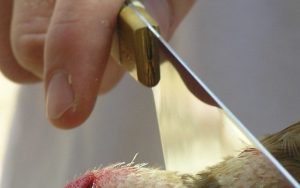 Religious slaughter is at least as humane as conventional mechanical slaughter. The British Veterinary Association should look elsewhere
Religious slaughter is at least as humane as conventional mechanical slaughter. The British Veterinary Association should look elsewhere
The head of the British Veterinary Association has said that religious slaughter methods need to change to prevent animal suffering. It is unfortunate that the BVA and other animal welfare organisations in the UK tend to view religious slaughter as incompatible with humaneness; quite the contrary is true – compassion and animal welfare stand at the centre of the entire process.
Shechita and zabiha are not words commonly known by the public, but to Jewish and Muslim communities they are synonymous with sincerely held, religiously mandated care for animals. They refer to the Jewish and Muslim humane methods of slaughter of animals for food, and the body of religious law in which they are contained talks not only about the last two seconds of an animal’s life, but about its treatment from birth.
There is much difference between shechita and zabiha, but both quickly dispatch the animal by severing the structures at the front of the neck – the trachea, oesophagus, carotid arteries and jugular veins. When carried out by a trained practitioner, the speed and precision of the incision ensures the lack of stimulation of the severed structures and results in the immediate loss of consciousness; blood flow to the brain is completely halted. In addition, blood empties rapidly from the brain.
Irreversible cessation of consciousness and insensibility to pain are achieved, providing the most effective stun. There is no delay between stun and subsequent death, so the animal cannot regain consciousness – as can happen with conventional slaughter methods.
Traditional British methods of stunning by use of a captive bolt, gassing or electrocution (by electrified pincers for larger animals, or a water bath with an electric current running through it for poultry) paralyse the animal, and it is unable to display outward signs of feeling pain. However, it is impossible to know whether the animal is feeling pain or not.
There is ample scientific evidence that religious slaughter is at least as humane as conventional mechanical slaughter. Research in the UK and the US, including by Dr Temple Grandin – one of the authorities on animal welfare – have supported this view. By contrast, many of the studies that suggest that religious slaughter causes unnecessary pain have been agenda-driven and methodologically flawed, stretching data in a distinctly unscientific fashion to unsupported conclusions.
It is remarkable therefore that religious slaughter can generate such a huge amount of publicity and media scaremongering when in fact the number of animals affected is extremely low. Halal and kosher meat are responsible for a fraction of the cattle slaughtered in the UK.
So even if one believes, despite the lack of scientific consensus, that religious slaughter is cruel, it is deeply troubling that the BVA has chosen to focus its attention on religious slaughter rather than other, far more pressing animal welfare issues. For example, between 2009 and 2011 the campaign group Animal Aid filmed secretly and found evidence of unspeakable cruelty and illegal activity in eight of nine randomly chosenBritish slaughterhouses: animals were kicked, slapped, stamped on, and even burned with cigarettes. We are yet to hear of a campaign by the BVA to root out this kind of cruelty.
Similarly, the European Food Safety authority found in 2004 that the failure rate for the much-trumpeted penetrating captive bolt stunning in conventional mechanical slaughter may be as high as 6.6%, and up to 31% for non-penetrating captive bolt and electric stunning. This equates to millions of animals each year that experience incredible suffering. But the BVA has not mounted a campaign on this.
There will always be a discussion about what can be learned from scientific evidence, and the Jewish and Muslim communities stand ready to debate in any constructive forum. But let us not pretend that religious slaughter represents a key battleground for animal welfare in this country – to do so is disingenuous in the extreme.



